Opinion
Artificial Intelligence,the UN and global safety

By Sonny Aragba-Akpore
When on October 30,2023 United States President Joe Biden signed an Executive Order to ensure that Artificial Intelligence (AI) be made safe and accessible to all humanity,he saw the future of things to come.
Perhaps he wanted to foreclose what could happen in future when the human race becomes addicted to the workings of AI.
For instance,the United States is in court with Apple because of what it termed the unnecessary monopoly the company enjoys for the proprietary of its products including I-Phones,I-pads and the rest on that platform.
Deriving from the Executive Order therefore,the US and 122 other nations sponsored a position paper that could make the AI safe and available for all humanity at the UN General Assembly in New York on Thursday March 21,2024.
And the UN General Assembly voted overwhelmingly for its endorsement.
Though sponsored by by the United States and co-sponsored by 123 countries, including China, the U.N. adopted the proposal by consensus with a bang of the gavel and without a vote, meaning it has the support of all 193 U.N. member nations.
U.S. Vice President Kamala Harris and National Security Advisor Jake Sullivan called the resolution “historic” for setting out principles for using artificial intelligence in a safe way.
Secretary of State Antony Blinken called it “a landmark effort and a first-of-its-kind global approach to the development and use of this powerful emerging technology.”
Being the first of its kind to be approved by the General Assembly on artificial intelligence it gave support to an international effort to ensure the powerful new technology benefits all nations, respects human rights and is “safe, secure and trustworthy.”
The International Telecommunications Union (ITU) has been at the forefront promoting standards and regulations that could serve as guidelines for AI development,the U.N. resolution has added strength to ITU positions.
“AI must be in the public interest – it must be adopted and advanced in a way that protects everyone from potential harm and ensures everyone is able to enjoy its benefits,” Harris said in a statement.
At last September’s gathering of world leaders at the General Assembly, President Biden said the United States planned to work with competitors around the world to ensure AI was harnessed “for good while protecting our citizens from this most profound risk.”
And by October 30,2023 he signed the Executive Order which gave birth to the sponsorship of Thursday March 21,2024.
As part of the Biden-Harris Administration’s comprehensive strategy for responsible innovation, the Executive Order builds on previous actions the President has taken, including work that led to voluntary commitments from 15 leading companies to drive safe, secure, and trustworthy development of AI.
The EO Requires that developers of the most powerful AI systems share their safety test results and other critical information with the U.S. government. In accordance with the Defense Production Act, the Order will require that companies developing any foundation model that poses a serious risk to national security, national economic security, or national public health and safety must notify the federal government when training the model, and must share the results of all red-team safety tests. These measures will ensure AI systems are safe, secure, and trustworthy before companies make them public.
Develop standards, tools, and tests to help ensure that AI systems are safe, secure, and trustworthy. The National Institute of Standards and Technology will set the rigorous standards for extensive red-team testing to ensure safety before public release. The Department of Homeland Security will apply those standards to critical infrastructure sectors and establish the AI Safety and Security Board. The Departments of Energy and Homeland Security will also address AI systems’ threats to critical infrastructure, as well as chemical, biological, radiological, nuclear, and cybersecurity risks. Together, these are the most significant actions ever taken by any government to advance the field of AI safety.
Protect against the risks of using AI to engineer dangerous biological materials by developing strong new standards for biological synthesis screening. Agencies that fund life-science projects will establish these standards as a condition of federal funding, creating powerful incentives to ensure appropriate screening and manage risks potentially made worse by AI.
Protect Americans from AI-enabled fraud and deception by establishing standards and best practices for detecting AI-generated content and authenticating official content. The Department of Commerce will develop guidance for content authentication and watermarking to clearly label AI-generated content. Federal agencies will use these tools to make it easy for Americans to know that the communications they receive from their government are authentic—and set an example for the private sector and governments around the world.
Establish an advanced cybersecurity program to develop AI tools to find and fix vulnerabilities in critical software, building on the Biden-Harris Administration’s ongoing AI Cyber Challenge. Together, these efforts will harness AI’s potentially game-changing cyber capabilities to make software and networks more secure.
Order the development of a National Security Memorandum that directs further actions on AI and security, to be developed by the National Security Council and White House Chief of Staff. This document will ensure that the United States military and intelligence community use AI safely, ethically, and effectively in their missions, and will direct actions to counter adversaries’ military use of AI.
Although,the EO was specifically for the USA,the adoption of a resolution by the U.N. General Assembly has carved out a position that will guide all global players in the AI firmament.
Strangely over the past few months, the United States worked with more than 120 countries at the United Nations — including Russia, China and Cuba — to negotiate the text of the resolution adopted on Thursday March 21,2024.
“In a moment in which the world is seen to be agreeing on little, perhaps the most quietly radical aspect of this resolution is the wide consensus forged in the name of advancing progress,” U.S. Ambassador Linda Thomas-Greenfield told the assembly just before the vote.
“The United Nations and artificial intelligence are contemporaries, both born in the years following the Second World War,” she said. “The two have grown and evolved in parallel. Today, as the U.N. and AI finally intersect we have the opportunity and the responsibility to choose as one united global community to govern this technology rather than let it govern us.”
Shortly after the vote, Representatives from the Bahamas, Japan, the Netherlands, Morocco, Singapore and the United Kingdom enthusiastically supported the resolution, joining the U.S. ambassador who called it “a good day for the United Nations and a good day for multilateralism.”
Thomas-Greenfield was quoted by Agency reports saying that she believes the world’s nations came together in part because “the technology is moving so fast that people don’t have a sense of what is happening and how it will impact them, particularly for countries in the developing world.”
“They want to know that this technology will be available for them to take advantage of it in the future, so this resolution gives them that confidence,” Thomas-Greenfield said. “It’s just the first step. I’m not overplaying it, but it’s an important first step.”
The ITU plans big for AI and states the future will see large parts of our lives influenced by Artificial Intelligence (AI) technology. Machines can execute repetitive tasks with complete precision, and with recent advances in AI, machines are gaining the ability to learn, improve and make calculated decisions in ways that will enable them to perform tasks previously thought to rely on human experience, creativity, and ingenuity.
The ITU believes that “AI innovation will be central to the achievement of the United Nations’ Sustainable Development Goals (SDGs) by capitalizing on the unprecedented quantities of data now being generated on sentiment behavior, human health, commerce, communications, migration and more” adding that ITU will provide a neutral platform for government, industry and academia to build a common understanding of the capabilities of emerging AI technologies and consequent needs for technical standardization and policy guidance.
By May 29,this year,when Nigeria
marks the first year of a new regime and speeches are being made at the Eagle Square or somewhere else in the country,global technology leaders will converge in Geneva,but Nigeria is not likely going to be on their minds ,as discussions will focus on AI governance that will explore the surge in global efforts to craft AI policy, regulation, and governance frameworks.
“The AI Governance Day will bring together representatives of governments, companies, academia, civil society, and UN agencies and this aims to forge pathways to transform dialogue around AI governance into impactful action” according to ITU documents.
From May 30 to 31,Global leaders and innovators in artificial intelligence (AI) will join the humanitarian community at the AI for Good Global Summit 2024 in Geneva, Switzerland to explore how new technology can drive sustainable development.
This year’s edition of the AI for Good summit event will showcase innovations in generative AI, robotics, and brain-machine interfaces that can accelerate progress in areas such as climate action, accessibility, health, and disaster response.
Summit speakers, including some of the world’s foremost AI luminaries, will explore the latest breakthroughs in AI and examine actions to ensure that AI works to humanity’s benefit.
“ITU’s yearly AI for Good Global Summit brings together a diverse set of voices to look at the latest AI developments and find ways to ensure this technology remains a force for good, driving inclusive growth and sustainable and equitable progress for all,” said ITU Secretary-General Doreen Bogdan-Martin. “This summit and our year-round AI for Good platform are powerful tools for accelerating progress in our race to achieve the UN Sustainable Development Goals by 2030.”
Opinion
CELEBRATING A PRODIGIOUS WORDSMITH: TUNDE OLUSUNLE @ SIXTY
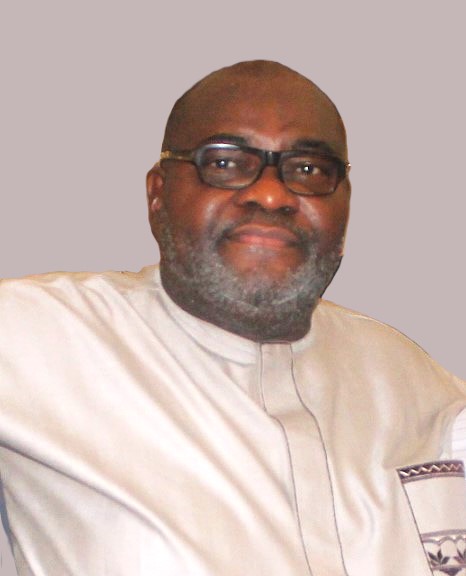
BY BOLAJI AFOLABI
Poring over countless title-ideas for this article, the above emerged from the blues. Further checks about the subject confirmed the title as fit and proper. Describing Tunde Olusunle as a “prodigious wordsmith” is no exaggeration. In every of his work, he comes across as one who has vocabulary virtuosity, and endowed with narrative mastery. He displays unimaginable linguistic dexterity which is intertwined with rhetorical flair, and imbued with creative vision. He carves the right words, and descriptive styles to paint beautiful scenery of complex and cumbersome situations. He crafts, engages, and suspends readers till the last words are happily soaked in. So, the title is both deliberate and intentional.
Dr. Tunde Olusunle, an Adjunct Professor of Creative Writing at the University of Abuja; which was recently re-named Yakubu Gowon University, is a man of many parts. He is a celebrated journalist; author; poet; communicator; and public speaker. Thus, he fits into all the fields where intellect, elucidation, and erudition coalesce. As a Columnist and Editor, he rose to the top of Journalism. In Literature, aside from having degrees, he has many published (and yet to be published) poems. He has written, co-written, edited, and co-edited over a dozen books; earning the Fellowship of the Association of Nigerian Authors, (FANA). In the last few years in academia, he is making exceptional accomplishments as a scholar, teacher, and researcher nurturing and mentoring a new generation of creative writers.
Sometime in the ’90s; during the Late General Sani Abacha regime, the writer went to the Saka Tinubu, Victoria Island, Lagos office of an elder brother; Ade-Ralph Olamife. After late lunch at the classy canteen within the precincts of the Nigeria Telecommunications Limited, (NITEL) offices, the host extended an invitation. He said, “I want you to join me later today to meet a friend coming from Ikeja.” About 7 pm, we (Olamife, two other friends, and the writer) drove into Bishop Oluwole Street in Victoria Island, Lagos. The building was the Kogi state Liaison Office at that time. Surprisingly, the august friend, who came with another person was already seated. After the exchange of pleasantries, the subject of this article was introduced by Olamife. Olusunle, who came with Alhaji Hakeem Bello; later Media Adviser to Babatunde Raji Fashola, (SAN), interacted freely with everyone. During the over two hours sit-out, Olusunle came across as a witty, lively, intelligent, and brilliant personality.
After this first meeting, the writer; through Olamife had subsequent interactions with Olusunle in Ikeja, Maryland, Ikoyi, and Victoria Island areas of Lagos. On every occasion, he exudes confidence and accessibility just as his humble and humane attributes come alive. After over a year of gap, largely due to the analogue communication state, and his relocation out of Lagos, Olamife broke the cheering news of Olusunle’s appointment as the Chief Press Secretary to the Kogi state Military Administrator; Col. Paul Omeruo. A few months later, the writer accompanied (as usual) Olamife; to visit Omeruo in Lokoja. By the way, both Olusunle and Olamife are mutual friends to the Administrator, fondly referred to as PUNO; initials of his names. During the two-week visit, Olusunle was the perfect host; he made every evening eventful and memorable. From discussions, many civil servants spoke glowingly about him. In and around the Lugard House; Administrator’s residence and office, as well as Ministries, Departments, and Agencies, (MDAs), his interpersonal relationships were eulogized. Succinctly, he could be described as a people’s man.
With the birth of democracy in May 1999, and the inauguration of Chief Olusegun Obasanjo as the President and Commander in Chief of Nigeria, the writer partially relocated to Abuja, hoping to explore opportunities in the new government. Watching the Nigerian Television Authority’s flagship news, the advert inviting people to the official launch of the new administration’s “Campaign for National Rebirth” sounded interesting. The writer made his way to the purposely-built Eagle Square venue of the event. As the programme progressed, the presence and importance of Olusunle was very evident. Events over, the writer swiftly moved from the stands down the platform to offer salutations to him. Pushed, shoved aside by over-zealous security operatives, it was a herculean task. At the point of giving up, an incident happened which diverted the attention of almost everyone. Leveraging on this, the writer made his way to the dais. Standing before Olusunle, he called the writer’s name, hugged, and exchanged pleasantries. Quickly, he said, “I’ll be out of Abuja for one week, meet me at Sheraton Hotels next week please.”
The writer’s visit to Sheraton Hotels marked the beginning of a relationship that has grown in leaps and bounds. Either at the Hotel’s Papillon Restaurant or the Poolside Bar, and Nicon Noga (now Transcorp) Hilton Hotel, the compassionate, empathetic, and accommodating attributes of Olusunle always come to the fore. They were unmistakable and unequivocal. During one of the numerous visits, he requested for the writer’s curriculum vitae; without saying what he wanted to do with it? It was discovered, early that he loves working behind the scenes. Beneficiaries of his advocacy, and benevolence only get to know when “food don done for eating.” One recalls on a visit to his 7th floor, Sheraton Hotels “temporary official residence” he beckoned on the writer to accompany him to somewhere. In a few minutes, we were in one of the suites at the Hilton Hotel, only to see Chief Onyema Ugochukwu, emeritus journalist, and public administrator walked in. With shock, suspense, and excitement written on one’s face, Olusunle introduced the writer saying, “Oga, this is one of our younger but silent supporters.”
A few months later, the import of that visit came to light. Through the persistent advocacy, and resilient prodding of Ugochukwu and Olusunle, President Obasanjo gave approval for major recruitments to strengthen the rebirth campaign, and public affairs management of the new government. So, the writer and other people benefitted from a forward-thinking proposal that was primarily targeted at media professionals who were part of the Obasanjo presidential campaign organization. Pastor Tumo Ojelabi, a retired Federal Director who was one of the beneficiaries declared that, “Oga, is a fastidious personality, a determined helper who can be positively stubborn, and dogged when pursuing a course that he has strong conviction about.” Continuing, Ojelabi, who was the official Photographer to Obasanjo during the presidential campaign said, “but for his resilience, courage, and never-quiver spirit; and Oga Ugochukwu, many of us who toiled during the campaigns would have been left dry.” For Mr. Taiwo Akinyemi, who was Obasanjo’s campaign Official Videographer, “Olusunle is a fighter; a dynamic fighter for other people. When he realized that politicians who did not contribute much to Baba’s electoral success were getting their loyalists into the new government, he fought relentlessly for us all. God used him to get me employed in the federal civil service, I remain eternally grateful.”
Olusunle is a pan-Nigerian, totally detribalized, and not given to ethnicity, religious segregation and similar stereotype. Described by close friends as diligent, dedicated, and devoted to friendship, Olusunle remains a restless and tireless quester for knowledge and new challenges. Given his multi-dimensional, and multi-tasking skills and proficiencies, he can excel in whatever profession, assignment, and position. Energized by his voracious search for new ideas, he is almost, always thinking out of the box. Very ingenious, creative, and imaginative, one recalls few initiatives that came from his fertile mind during the Obasanjo presidency. Persistent encouraging words about Nigeria’s sports which led to the inclusion of the “sports brief” to his schedules. Advocacy for the hosting of the Commonwealth Heads of Government Meeting, (CHOGM) at any of the nation’s resorts; which informed him leading a team of journalists, tourism experts, and bureaucrats to the Yankari Games Reserves in Bauchi. What about the National Media Tour, though initiated by him but hijacked by a few top government officials who at the end muddled the entire programme?
Corroborating, Mr. Vincent Oyefeso, a retired Federal Director, and another beneficiary of the Obasanjo appointments approval, said, “he is an illustrious Nigerian and a patriot per excellence, who bestrides many walks of life as an intellectual collossus, a humanist of no mean hue, and an advocate of the finest social ethos. At the realms of public communications, the academia, and public service, he exudes the best practices worthy of emulation by right-thinking compatriots.” For Mr. Ukadike Uwabor, a media communications consultant, “since I’ve known him, he has remained consistent with the core values of excellence, versatility, and intellect. He relates perfectly with different people no matter the age, religion, tribe, or social status. Little wonder his friends cut across different strata of the society. That the people of Umukabia autonomous community in Abia state conferred on him a chieftaincy title; which is outside his geographical, ethnic, and linguistic zone speaks volumes about his personality.” Olusunle by the way, has few other titles bestowed on him in different parts of the country.
Agreed, no human being is perfect but the writer has personal experiences about Olusunle that remains nostalgic. Indeed, the over two decades relationships have grown from one stage to the other. From boss to teacher, mentor, and motivator. He has played (and continues to play) different roles in one’s professional development, and career progression. Perhaps, he may not realize this; while working with him, Olusunle doesn’t attend meetings alone. The writer, Late Alhaji Wasiu Anjous, and (on few occasions) Akinyemi accompanied him to any meeting, particularly with MDAs. Another striking feature was that he introduced you as a “colleague.” With that, one’s stock, respect, and recognition increases. One of the fall-out of such remarkable style happened at the 2004 Olympics Games in Greece, when Late Mr. Solomon Matankari, Nigeria’s Chef de Mission, and Sports Ministry’s Permanent Secretary insisted on the participation of Anjous and the writer in high-level meetings.
Not persuaded by the hierarchical structure of the civil service, Olusunle places premium on availability, delivery, and consistency. Just a few months after being deployed to his office, the writer had a baptism of fire. Barely 48 hours after one of the regular presidential chats, Olusunle passed the recorded tape, and declared, “do transcribe and deliver in three days.” Sensing shock, and surprise, he encouraged, “you can do it, go at your pace.” On another occasion, a few days after commending the writer on a piece, “From Saw Dust To The Skies,” he said, “write a speech for Dr. Mrs. Kema Chikwe, the Aviation Minister, for a programme this Saturday to be held in Garki, Abuja.” Though tough but exciting, it marked my entry into the exclusive class of speech writers; till this moment. Sometime in 2023; after long hiatus from opinion writing, due to a new assignment at the National Assembly, the writer did a piece. Impressed, Olusunle called immediately, “BJ, I’ve just read your brilliant article. I encourage you to make this more regular, please. I’m available to offer any support where and when necessary.” Truly, he has kept faith to his promise in the over thirty articles written between December 2023 and now.
This is the man we are celebrating today, and always. Olusunle is an extremely organized personality, whose writings and interventions are laced with irrefutable data, educative instances, and inspiring suggestions. When occasions demands, you can’t help but applaud his depth of knowledge, information reservoir, deep vistas, and un-ending capacity. Oyefeso prays that, “the Lord grants him peace as he steps into the sixth floor. The Father of Lights will continually uphold and uplift him from Glory to Glory in Jesus Name.” Mr. Jacob Zwings, aide to Director-General, National Orientation Agency added that, “Oga Tunde, in his own way has impacted positively on the lives of people. On the occasion of his Diamond jubilee, I pray that God will perfect everything that concerns him and his family.” Akinyemi declared that, “just as he has been a blessing to other people’s children, God will bless him, his wife, and children.” Uwabor believes that, “Enyi Oha has become a reference point to many people. The good Lord will grant him more years in good health as he age gracefully with abundance of all-round blessings.” Ojelabi affirmed that, “Olusunle is who he is today; an accomplished man who stands tall among his peers because of his commitment towards extending helping hands to those who needs it.”
* BOLAJI AFOLABI, a Development Communications specialist was with the Office of Public Affairs, The Presidency, Abuja.
Opinion
PROFESSOR HUMPHREY NWOSU: THE UNSUNG HERO OF TRUE NIGERIAN DEMOCRACY
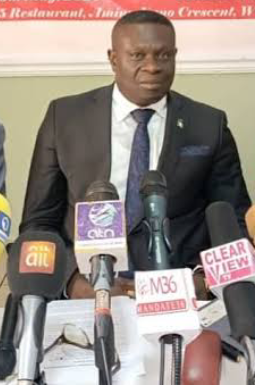
Written by Dr. Nwambu Gabriel,Director General, Centre for Credible Leadership and Citizens Awareness
Introduction
The journey to democratic governance in Nigeria has been fraught with challenges, conflicts, and untold sacrifices. Among the gallant figures who stood resilient in the face of adversity was Professor Humphrey Nwosu. As we mourn the loss of a remarkable leader and an indomitable champion of democracy, we reflect on his contributions and unwavering commitment to the electoral process, which laid a foundational path for Nigeria’s democratic practice.
A Visionary Electoral Leader
Professor Nwosu’s tenure as Chairman of Nigeria’s National Electoral Commission (NEC) from 1989 to 1993 marked a pivotal era in the nation’s electoral history. Unlike many of his contemporaries, Nwosu approached his responsibilities with an unwavering resolve to uphold the sanctity of the electoral process. He successfully organized several elections, including Local Government Chairmanship, Governorship, and State and National Assembly elections, which were lauded for their transparency and fairness. His most significant achievement came with the conduct of the June 12, 1993, presidential elections, widely regarded as one of the freest and fairest elections in Nigeria’s history.
Courageous Stand Against Adversity
In an environment characterized by military interference and political manipulation, Nwosu exemplified courage. He boldly overturned a court order issued on June 10, 1993, that sought to halt the presidential elections. Despite facing intense pressure from the military establishment led by Ibrahim Babangida (IBB), he remained resolute, emphasizing his commitment to ensuring that the elections were conducted as planned. His insistence on completing his mandate, even when his commission was dissolved midway through the electoral process, is a testament to his integrity and dedication.
His unyielding stance culminated in the announcement of results from 29 out of 30 states in the June 12 elections. Although General Ibrahim Babangida annulled the elections before Nwosu could declare the final results, his steadfastness demonstrated his belief in the democratic process and the necessity of honoring the voice of the Nigerian electorate.
Championing Democracy Through Documentation
Professor Nwosu did not allow the annulment of the June 12 elections to silence his voice. In his book, *Laying the Foundation of Nigeria’s Democracy: My Account of June 12, 1993 Presidential Election and Its Annulment*, he chronicled the events leading to the election and its aftermath. By publishing the results of the June 12 elections, he presented irrefutable evidence of MKO Abiola’s victory, reinforcing the notion that the people’s will should prevail over political machinations. This documentation serves as a historical account of a significant moment in Nigeria’s struggle for democracy and a rallying cry for future generations.
Legacy of Integrity
As we reflect on Professor Nwosu’s life and contributions, it is essential to recognize his legacy of integrity, bravery, and unwavering commitment to democratic principles. He stood as a beacon of hope during a tumultuous period in Nigerian history, proving that one individual’s resolute stand could indeed lead to monumental change. His story serves as an inspiration to current and future leaders to prioritize the will of the people over personal or political gain.
Conclusion
The passing of Professor Humphrey Nwosu is not just a loss to his family and friends but to a nation that desperately needs champions of democracy. His actions during the critical moments of June 12, 1993, solidified his place in history as a true man of democracy. As we commemorate his life, we are reminded that democracy thrives through the courage and integrity of individuals like Professor Nwosu—those who are willing to stand firm against oppression and ensure that the voice of the people is heard.
May his soul rest in peace, and may his legacy continue to inspire generations to uphold the values of democracy, transparency, and justice in Nigeria.
Opinion
Hon. (Dr.) Saheed Mosadoluwa: A Beacon of Visionary Leadership
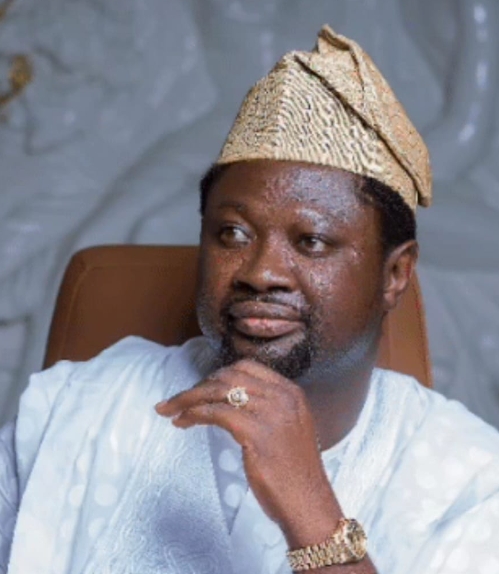
In an era where effective leadership is more crucial than ever, Hon. (Dr.) Saheed Mosadoluwa stands out as a beacon of visionary leadership. His approach transcends traditional governance, embodying a blend of innovation, empathy, and strategic foresight that inspires those around him and fosters community growth.
Pioneering Change Through Vision
Dr. Mosadoluwa’s leadership is characterized by a clear, forward-thinking vision. His ability to foresee challenges and opportunities allows him to craft policies that not only address current issues but also lay the groundwork for a prosperous future. He understands that visionary leadership is not just about having a great idea; it is about mobilizing resources, people, and initiatives to turn ideas into reality.
Empathy and Inclusivity at the Core
At the heart of his leadership philosophy is a deep sense of empathy. Dr. Mosadoluwa believes that true leadership involves listening to the voices of the people and prioritizing their needs. He fosters an inclusive environment where diverse perspectives are valued, ensuring that every stakeholder feels heard and respected. This commitment to inclusivity not only strengthens community ties but also enhances the effectiveness of governance.
Innovative Solutions for Sustainable Development
Dr. Mosadoluwa recognizes the complexities of today’s challenges and approaches them with innovative, sustainable solutions. He champions initiatives that leverage technology, education, and sustainable practices to drive development. His focus on smart, sustainable urban planning and community-driven projects demonstrates his commitment to fostering resilient communities that can thrive in the face of adversity.
Empowering Future Leaders
As a visionary leader, Dr. Mosadoluwa is dedicated to empowerment. He actively mentors the next generation of leaders, believing that true leadership involves creating opportunities for others to grow. Through workshops, seminars, and community engagement initiatives, he inspires young minds to develop their leadership potential and become active participants in shaping their futures.
Commitment to Transparency and Accountability
Honesty and integrity are cornerstones of Dr. Mosadoluwa’s leadership. He believes that transparent governance builds trust within the community. By promoting open communication and accountability, he sets a standard for ethical leadership, ensuring that decisions are made in the best interest of the community.
Conclusion
Hon. (Dr.) Saheed Mosadoluwa is more than just a leader—he is a visionary. Through his innovative strategies, empathetic approach, and commitment to inclusivity, he is redefining the true definition of what Leadership. As he continues to inspire and enact positive change, Dr. Mosadoluwa remains dedicated to building a better future for all, proving that with visionary leadership, anything is possible.
-

 Business22 hours ago
Business22 hours agoBank stops transfer fees on online transactions
-

 News9 hours ago
News9 hours agoRivers APC demands Fubara’s probe over ex-HoS allegations
-
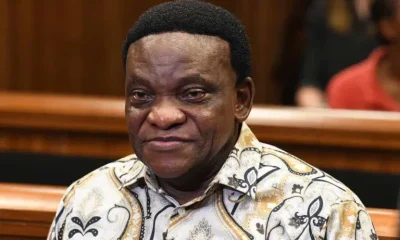
 News22 hours ago
News22 hours agoS/African Court Acquits Nigerian Pastor Of Rape, 31 Other Charges
-

 Economy1 hour ago
Economy1 hour agoSEE Black Market Dollar To Naira Exchange Rate Today 3rd April 2025
-

 News24 hours ago
News24 hours agoTinubu to embark on working visit to Paris
-

 Economy10 hours ago
Economy10 hours agoNaira rebounces against the dollar in parallel market
-

 News8 hours ago
News8 hours agoAir Algerie Inaugural Flight to Abuja Will Strengthen Nigeria-Algeria Ties – FG
-
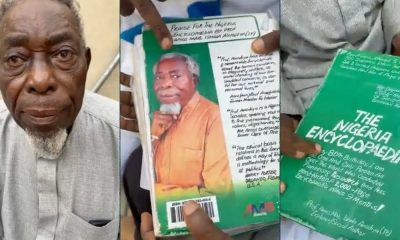
 News10 hours ago
News10 hours agoVideo: Professor Returns To Nigeria With Nothing After 48 Years In Canada





